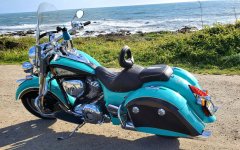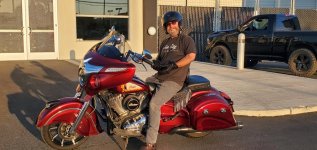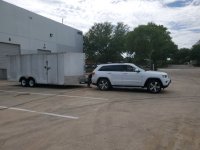I first had a trailer in 2009, owning two since then, a little tent trailer, and more recently, a two axle fifth wheel. I've naturally had an interest in trailer tires, and from what I've seen, a lot has changed over the years.
Until a few years ago, virtually all ST tires were garbage. Poorly built, even by the big name brand (the only one in that segment). "China bomb" is a common term in reference to trailer tires, owing that they were often built in factories, usually in China, that had virtually no quality control.
I did a lot of my own homework in this area trying to figure out a viable alternative to the ST tires, and based on what I've learned, including from our own resident tire professional, CapriRacer, these are some basics:
- ST tires were largely an abandoned market, left to companies that did not seem to care one bit about quality
- Bias ply were common in smaller sizes, as they were easier to build to carry heavy loads when compared to radials
- Bias ply also tended to have shorter life spans, run hotter, and blow out more frequently, though the blow outs were usually nothing spectacular
- Radials when they did blow out did so much more catastrophically - in most applications not a real issue as it was rare (outside of poor tire care), except when it came to trailer tires
- LT tires, when it comes to load capacity, have to meet similar specs to their LT cousins, but are of course subject to more requirements - they are intended to be put on a vehicle that is driven, so need cornering and braking capabilities, and are, for any given load, given a rating with a huge margin compared to what they can actually handle, versus the ST tires, which are rated to a figure close to their true capacity.
- LT tires theoretically lack the compounds the ST tires have to help them withstand long periods of sitting idle
- LT tires are typically 16" and larger, though you may have very limited luck getting them in 15" or 14" in North America, but they will be known by their European name of "Commercial Van Tires" - you would see them with the letter C at the end (not to be confused with load range): eg. 185R14C - I actually used this size on my tent trailer. Problem with these commercial van tires is they are hard to find, especially in the smaller 14" size.
- LT and the commercial van tires have been installed by trailer manufacturers around the world as an alternative to ST tires.
- ST tires, unless otherwise marked, have a speed rating of 65 mph. LT tires have the typical speed ratings of Q, R, S, T, etc. I would rather have a rating of a speed much higher than I would tow at, rather than right at the speed I would tow at.
- Michelin once suggested on their website to look at their LT tires for trailer tire replacement.
- Tires in general, people say to replace in the 6 to 10 year old range, with hot climate tires recommended for replacement at 6 years, and cold climate well cared for tires possibly up to 10. But for ST tires, at least the older options, 5 years seems to be the absolute longest you would want to go, regardless of where you live. You can, in theory, get longer service life using LT (and therefore lower costs). Based on where I live and travel, my comfort zone is very close pre-trip inspections, and be prepared for replacement from 6 years onwards, likely just doing it at 8 years regardless - I live in Edmonton, Canada.
- Many people will state that you can't use LT in place of ST, though they never come up with a solid reason why.
My LT experience has been very positive. I used the commercial van tires on the tent trailer from 2013 to 2016, and took the trailer on several long cross Canada and cross US trips, and had much more confidence than the ST tires before them. In 2017, I replaced the tires on our fifth wheel we just bought with LT tires before hitting the road with them (not counting the trip home I did with the original ST tires). Again, taken across both Canada and the US with zero issues.
Since then, some things have changed in the ST tire world. I've heard some people say they've had good luck with Maxxis and Carlisle. Also, Goodyear replaced the notorious Marathon with their Endurance. I am not a Goodyear fan, but I have not heard any bad things about the Endurance.
In the larger 16" sizes, Sailun has an ST tire that seems to be very well regarded. Sailun, though Chinese, seems to march to a different drum than other companies making tires there, and seems to be focused on having a reputation for good quality in the budget market. Their ST tires are very heavy and solid, and look more like the truck tires you would see on a semi.
Hankook just entered the ST market last year with their Vantra line. Too new to know for sure, but there doesn't seem to be anything negative out there about them. They have tires from 13" to 16".
If I were shopping today, I would personally look at options that range from the LT tires, to the better ST tires like Sailun and Hankook, and would think that anyone looking at Goodyear, Maxxis or Carlisle are also looking at very good choices.




